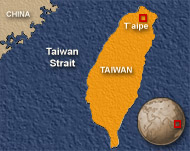Taiwan: China forming basis for attack
Taiwan has condemned China’s plan to draft an anti-secession law, describing it as a move to establish a legal basis to attack the island that Beijing claims as a province.

Vice-President Annette Lu said on Saturday the proposed law would have no bearing on Taiwan because China has no legal or historical rights to the island of 23 million people.
“They are using this method to announce to the world they will do anything to swallow up Taiwan and will establish the legal basis to do so,” Lu said.
Lu and President Chen Shui-bian reject the Chinese government’s claim that Taiwan is part of China and must be reunited with the mainland, by force if necessary.
China has been alarmed by what it sees as creeping moves towards secession by Chen, especially the Taiwan leader’s plans to adopt a new constitution by 2008.
Statehood
The move is viewed by Beijing as a declaration of statehood that can lead to war.
China planned to send the draft anti-secession law for deliberation during a parliament session from 25-29 December, Beijing‘s official Xinhua news agency said on Friday.
 |
|
China says Taiwan is part of the |
The move was seen to be aimed at heading off formal Taiwan independence.
“They are looking for a legal basis to invade Taiwan,” said Chiu Tai-san, vice-chairman and spokesman for the Mainland Affairs Council, which sets policy towards Taiwan‘s arch-rival.
“If they want to punish or invade Taiwan they must have some legal basis to make it okay to attack,” Chiu said.
Reunification vs secession
Major state-controlled Chinese papers carried the Xinhua report on their front pages on Saturday, but they did not refer directly to Taiwan and gave no more details.
China had earlier floated a “reunification” law, rather than an “anti-secession” law, and Xinhua did not explain the change.
Some Taiwan analysts said the new draft was passive in nature, and could be a slight improvement in the sense that China would be legally obliged to prevent Taiwan independence, but would not necessarily push urgently for unification.
Chiu said the anti-secession law could be the precursor to a plan to implement a unification law in stages, to gradually build pressure on Taiwan.
Timing
Some analysts were surprised at the timing of the announcement, as it came after Chen’s pro-independence party and its allies suffered a defeat in legislative elections on 11 December.
|
“We thought a showdown can be avoided and that tensions will lower after the election. But this is the start of another vicious cycle” George Tsai, |
An opposition alliance more conciliatory towards Beijing had won a slim majority of seats, dealing a setback to Chen’s plan for constitutional reform. The result had been expected to help reduce tensions with China.
“We thought a showdown can be avoided and that tensions will lower after the election,” said George Tsai, a China watcher at National Chengchi University‘s Institute of International Relations. “But this is the start of another vicious cycle.
“This is not good for cross-strait relations and no help to China‘s aim to win the hearts and minds of Taiwan people.”